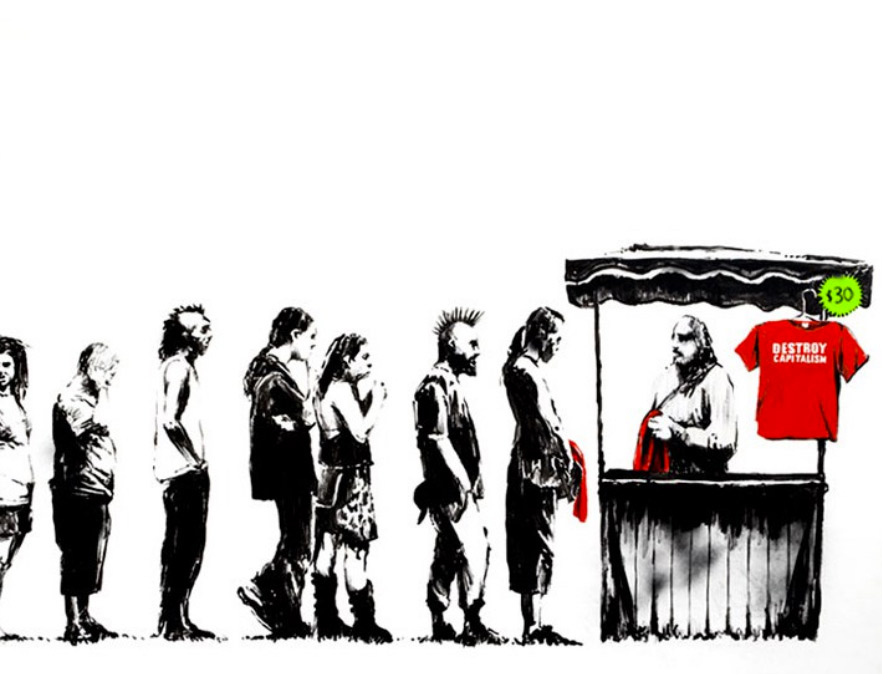“Subvertising” is no better than corporate advertising.
This whole recent trend of linking every-goshdarn-thing to politics is a huge part of the problem.
People need to be taught to think for themselves, not listen to what other people tell them is “true” or “fashionable.”
That applies to all instances in life, not just consumeristic (or even anti-consumeristic) communication.
Don’t get me wrong, I find the whole focus on consumerism appalling. It makes me laugh when pundits just can’t seem to figure out why, when the cost of living rises slightly, more people weren’t out buying more “stuff” when even a lightpost can figure out that those people are still trying to make ends meet from years of driving themselves into debt just to survive.
You don’t need more “stuff.” But by all means, if you want more “stuff” that is your own personal choice. I’m not going to talk you out of it. The “stuff” I buy, I look for things that are going to last or hold their value. I might pay a little more but damn, those tools are going to outlive me, that car is going to be worth something at trade in and maybe other people will keep buying consumeristic trash long enough that I can retire on my 401K.

I can’t remember where I read it, but I think it might have been in a psychology journal a few months back. Anyway, the subject was about critical thinking and how long-held assumptions about it being a teachable skill didn’t pan out when put to the test in controlled studies.
If I remember correctly, the study indicated that most people, despite having been taught critical thinking skills, defaulted to using confirmation bias, groupthink and myopic obstinance (my words) when forming opinions on issues that were less than clear-cut or that challenged their previously held assumptions.
People need to be taught to think collectively as well as individually.
My favorite example of anti-consumerist graphic design and animation:
I believe this… and I struggle with it every day. How can they not see the reality? The facts? Why do they see the actual information and disregard it?
I read a study (long time ago) that showed people generally only use maybe 25% of their brain.
Hopefully I’ll someday come to terms with it, and accept that many humans don’t much use the thinking part of their brain.
People do use all of their brain. It’s just that emotions override rational thought.
Also, hormones from other parts of the body effect emotions.
Yes. Most people believe the courses of their daily lives are governed by free will, By far the largest part of that free will, however, is spent figuring out how to best placate emotions and basic urges or adhering to mental templates burned into our minds over a lifetime of experience.
We get hungry, and the cognizant part of our minds is spent figuring out where to go to get rid of that hunger. We get bored and we don’t like how it feels, so we jump on this forum as a distraction from the boredom (like I’m doing now). We look forward to the weekends and make plans because it makes us feel just a little better to do so.
I could go on, but my point is that most people’s intellect is largely used up in efforts to placate and cater to those underlying emotions, urges and biases that we never really think about in the context of how they actually govern the way in which we interact with the world around us.
All I know is, they make me crazy. 
My favorite anti consumer artwork:
And I think these folks missed the point, or maybe they didn’t but the folks who’ll buy them did:
I’m curious about the “controlled studies” that determined “critical thinking” isn’t teachable. If they tried it on anyone over the age of 6, they did it wrong.
Humans need to learn early on that there are consequences for their actions. Critical thinking is learned sometimes through painful trial and error, and I don’t mean abuse. I mean like not getting a trophy for just participating, not getting the toy you wanted for Christmas, having to make a choice between two things equally wanted but you only get one, being told “no” once in a while, being given the opportunity to be the “odd man out,” being taught the difference between right and wrong, being given the opportunity to succeed but more importantly being allowed to fail. Humans aren’t born with a moral compass. Humans aren’t born with Common Sense. If you hand things to kids all of the time, they do not learn that some things are earned through hard work. They don’t learn the pride of accomplishment through the lesson of failure.
Of course an adult is going to fall back on ingrained habits. Humans are lazy organisms. It would probably take training for almost as long as the human has been alive to unlearn what they have learned with regards to their previously held assumptions, if they make no concerted effort themselves in the interests of being more aware of the whole of the world around them.
As for thinking collectively, I’m all for it, in a more libertarian way of thinking rather than the socialist. What I earn is mine. Not yours. I’m all for sharing, but I learned early on that if not everyone brought along enough food for the hike because they didn’t want to carry the weight, everyone ends up with less if you pool the food for the pot.
It’s demoralizing to lessen the pursuit of liberty and happiness.
It’s equally demoralizing if the pursuit of liberty and happiness is a zero-sum game.
Libertarianism and socialism may be counter-balancing, but they are not mutually exclusive.
Every government on the planet is socialist to a degree. A government without socialism is either 100% militarized, or is nothing more than a suggestion box.
I looked but couldn’t find the exact article, but did run into this article from the American Educator saying that critical thinking skills can’t really be taught or used by those who aren’t well-educated enough on a particular subject to be able to form rational, nuanced and informed opinions on those things they don’t understand. Instead, they form opinions based on superficial understandings and preconceptions that often fly in the face of facts and logic.
This sounds like a common sense conclusion, but it might point to the heart of the problem. I do agree with you, though, that critical thinking skills and healthy skepticism should be engrained in children at an early age. I might get in trouble with this statement, but teaching children to think critically might be difficult while also teaching them to believe in Santa Claus and accept various religious beliefs at face value that run contrary to common sense (sorry).
No, it’s not …there’s nothing equal about that …nothing.
The sum of what one does comes after the declaration of independence. A zero-sum game is still played within the rules.
Who’s rules?
You seem to be only interested in the winning end of a zero-sum game.
And what’s the difference between independence and interdependence? Do you know anyone who is completely independent? Do you know of any nation that is completely independent of all other nations?
Who’s rules ? The court’s rules, naturally.
Thanks for the judgment … but no I’m only interested in the ability to play the game on the equal footing as anyone else. The game’s outcome is only of secondary concequence.
The difference between independence and interdependence is one of precedence …as in the court protecting one’s intellectual property and the right(s) to pursue that protection to the fullest.
Sure, there’s googles of examples where interdependence is optimal but it also comes after the protection(s) of the right to pursue liberty and happiness.
At the expense of someone else’s right to pursue liberty and happiness? That’s the zero-sum game.
The game is never on equal footing. There’s always one side coming into the game with an advantage over the other side. That advantage might be their race, gender, class, experience, luck of circumstances, or the natural advantage one gets from having made the rules of the game. When the court is not a kangaroo court, it’s often lopsided, the judges are often biased, the jury is often rigged. But that’s better than the alternative of having no day in court at all, which is what some people get when they are executed by trigger-happy law enforcers
As much as I love this country, I’m not naive enough to think that the ideals it was founded on were thought through perfectly. The founding fathers were smart men, but they weren’t omniscient. That’s why they allowed for amendments to the constitution. Many of their ideas were great in a time when most people were farmers, well insulated from each other by distance, and insulated from guilt of the land they “tamed” by killing natives and nourished through the hands of slaves.
But now we live in different times. There’s a global economy whether we want it or not. We are interdependent on other countries, and interdependent on individuals within this country for almost everything we need to survive. Even if we were to isolate our selves and shrink our population, we would be up against all the other nations with growing populations and global trade competing for global resources. The right to pursue liberty and happiness comes with the price of social responsibility, what you might call socialism. Refusal to except that responsibility only increases the burden of law enforcement, safety, and security for everyone.
Accepting that responsibility means participating in a collective effort to dial back consumerism while at the same time helping to fulfill the basic survival needs of everyone who shares the land. But if you think of it as a zero-sum game, you won’t want to share the land, and you will be perfectly OK with the zero-sum game as long as you are winning it. I’d rather win at a non-zero-sum game. And if I can’t pursue liberty and happiness without hindering someone else’s, then I can’t enjoy the spoils. Competition is only healthy when the losers gain too. That’s why I say that it’s equally demoralizing if the pursuit of liberty and happiness is a zero-sum game. When you say “no, it’s not,” that’s just your individualized opinion. And you may change that opinion if you end up on the losing end.

